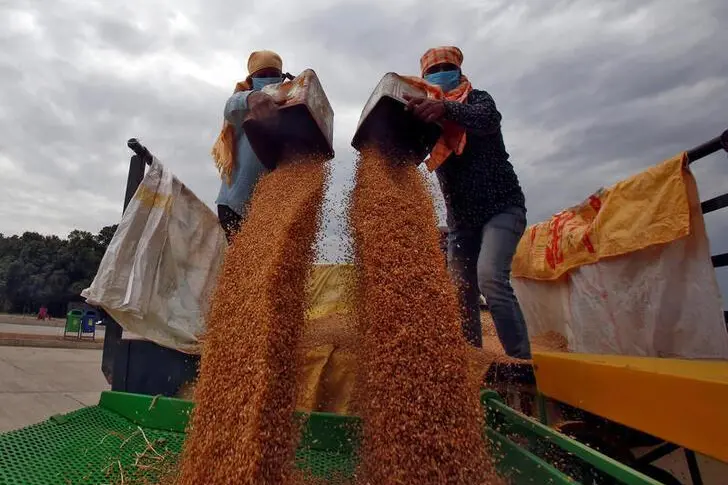PHOTO
Indian authorities need to promptly remove a 40% wheat import tax to facilitate overseas purchases of the grain and calm local prices in the world's second-biggest producer of the staple, the chief of a leading industry body said on Thursday.
India is trying to tame wheat prices by resorting to measures such as imposing limits on the amount traders can hold and offering the grain to bulk consumers from state reserves.
Wholesale wheat prices have jumped around 11% in the past four months to a seven-month high in August.
"One of the best ways to ensure that ample supplies lead to lower prices is to import wheat, but a 40% duty makes any import unviable," Pramod Kumar S, president of the Roller Flour Millers' Federation, told Reuters in an interview.
"The government should immediately abolish the wheat import duty to ensure that private trade can import wheat."
A top official on Aug. 3 said India could cut or remove the wheat import tax. Millers said the government shouldn't drag its feet on abolishing the duty. A government spokesman didn't immediately respond to a request for comment.
Once the government removes the 40% wheat tax, millers and private traders can import 2 to 3 million metric tons of the grain, he said.
Most flour millers, especially in southern states such as Kerala and Tamil Nadu are reeling from shortages, he said.
Since wheat is primarily grown in northern and central India, mills in the south spend more on transporting the grain.
"If the government removes the duty, flour mills in southern India, especially in Tamil Nadu and Kerala will immediately start importing Black Sea wheat. That will raise supplies and ease shortages until the next harvest," Kumar said.
Farmers will plant wheat in October, and start harvesting the crop in March.
Kumar said Black Sea wheat could be available at $280-$290 a ton, including cost, insurance and freight, nearly $40 a ton cheaper than rival supplies from other leading producers.
Wheat supplies have dropped as crop size was small.
Kumar last month told Reuters that the wheat harvest in 2023 was at least 10% lower than the government's estimate of a record 112.74 million metric tons. (Reporting by Mayank Bhardwaj; Editing by Sharon Singleton)





















